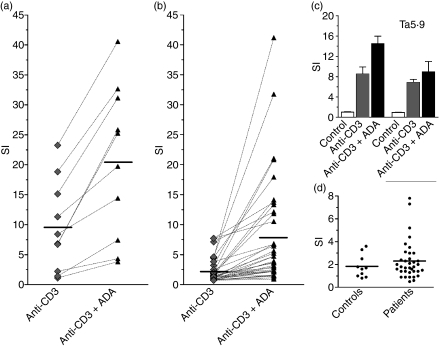Figure 1.
Adenosine deaminase (ADA) potentiates human T-lymphocyte proliferation triggered by anti-CD3. T cells from healthy donors (a, c, d) or human immunodeficiency virus 1 (HIV-1)-infected patients (b, d) were freshly isolated and stimulated with 1 ng/ml anti-CD3 [except in (d), where anti-CD3 was absent] in a 7-day assay in the absence or presence of 4 μm ADA. Proliferation was determined as [3H]thymidine incorporation. Values are expressed as the stimulation index (SI), calculated as the ratio of [3H]thymidine incorporated in stimulated T cells versus non-stimulated T cells. (a, b) T cells were stimulated in the absence (rhombuses) or presence (triangles) of ADA. Data are the mean of triplicates and each pair of linked symbols represents a different donor. (c) T cells were preincubated without or with 33 μg/ml of monoclonal antibody anti-CD26 Ta5·9 as indicated in the Materials and methods for 15 min before 4 μm ADA (black bars) or medium (grey bars) was added. T cells were triggered with 1 ng/ml anti-CD3 (black and grey bars) or not triggered (white bars). Representative data (mean ± standard deviation of triplicates) for one of 10 independent experiments are shown. (d) T cells from healthy donors (controls) or HIV-1-infected individuals (patients) were treated with 4 μm ADA in the absence of anti-CD3, and the SI was determined as the ratio of [3H]thymidine incorporated in ADA-treated versus non-treated T cells. Each dot represents the mean of triplicate measurements for the same donor and a solid line indicates the mean SI of each group.

